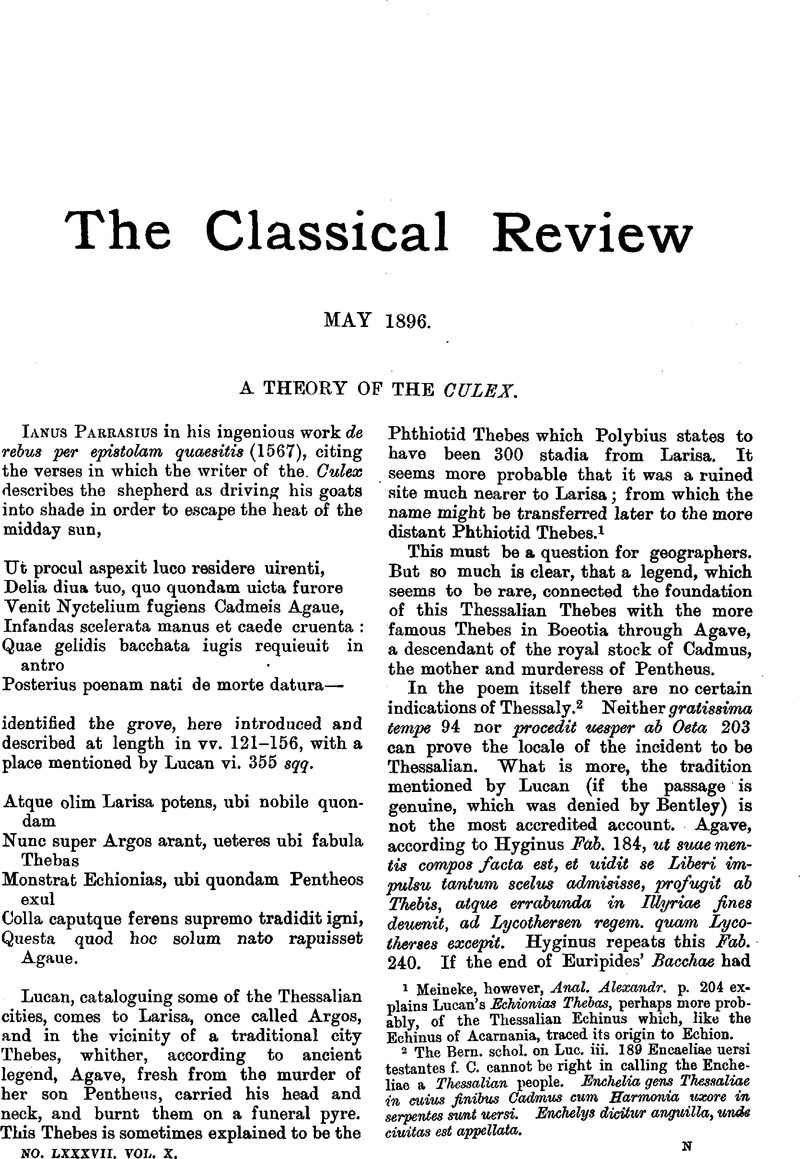No CrossRef data available.
Published online by Cambridge University Press: 27 October 2009

page 177 note 1 Meineke, however, Anal. Alexandr. p. 204 explains Lucan's Echionias Thebas, perhaps more probably, of the Thessalian Echinus which, like the Echinus of Acarnania, traced its origin to Echion.
page 177 note 2 The Bern, schol. on Luc. iii. 189 Encaeliae uersi testantes f. C. cannot be right in calling the Encheliae a Thessalian people. Enchelia gens Thessaliae in cuius finibus Cadmus cum Harmonia uxore in serpentes sunt uersi. Enchelys dicitur anguilla, unde ciuitas est appellata.
page 178 note 1 The schol. on Ap. R. iv. 507 expressly places the Enchelees in Illyria, about the Ceraunian mountains.
page 178 note 2 What this river was is uncertain. De Mirmont, p. 355 of his translation of A. Rh., says it was either the Rhizon or the Drilon. Bernhardy on Dionys. Perieg. 390 says ‘id tantum perspicitur, opinionem uariis opinionibus poetarum ac geographorum exornatam eo peruasisse, ut sepulcra quae Cadmi Harmoniaeque dicerentur in uicinia Drili atque Aoi fluuiorum reponerentur.’
page 178 note 3 Hemsterhuis thought this was the grandson of the tragic poet, in one of the Elegies ascribed to him by Suidas (Gaisford).
page 178 note 4 Scylax Peripl. 28 μετ δ' 'Ιλλνρí∘νς Χ∘νες. 30 μετ⋯ δ⋯ Χαον⋯αν Θεσπρωτοι. 31 μετ⋯ δ⋯ Θεσπρωτ⋯αν Κασσωπ⋯α, παροικο⋯σι δ⋯ οὗτοι ἔως εἰς τἰν’ Ανακτορικ⋯ν κ⋯λπον If Saumaise and Meineke are right in restoring Steph. Byz. 'Εχῖν∘ς πóλις 'Ακαρνανíας 'Εχíν∘υ κτíσμα. 'Ριανòς 'Εχ∘ν∘ς [MSS. Εχι∘ν]ἄστυ, there were cities which claimed to be founded by Echion as far southward as Acarnania.
page 179 note 1 Or, as Le Grand suggested, Epeiro.
page 179 note 2 The name of this town will recur to every reader of Cicero, flauit ab Epiro lenissimus Onchesmites, Att. vii. 2.
page 180 note 1 Because Appian B.C. iii. 9 states that the studies of Octavius at Apollonia were mainly in war, it does not follow that he did nothing else. We know that he attended Apollodorus of Pergamus as a pupil in rhetoric (Strab. 525, Suet. Aug. 89), having taken him to Apollonia for the purpose; and Plutarch (Brut. 23) says ν 'Απ∘λλωνᾳ διτριβεν σχ∘λζων περ λóγ∘υς. The anecdote mentioned by Sueton. Oct. 94 proves that he did not disdain to show an interest in astrology; the connexion of which pretended science with his life and destiny is often emphasized by Suetonius, Manilius and others. See Gardthausen Augustus und seine Zeit ii. p. 22, and on Augustus' horoscope pp. 16 sqq. and the valuable dissertation of Weichert de Augusti scriptis eorumque relliquiis 1835. Dion expressly tells us Octavius was trained (ἠσκεῖτ∘) in Greek rhetoric (45, 2), and we may feel sure, from his interest in literature, and his own writings, that he did not neglect Greek poetry. This is indeed stated by Suetouius 89 ne Graecarum quidem disciplinarum leuiore studio tenebatur: again, eruditione etiam uaria repletus est per Arei philosophi filiorumque eius Dionysii et Nicanoris contubernium.
page 181 note 1 Cf. Henry Aeneidea ii. 394 (on Aen. iii. 148).
page 181 note 2 It is remarkable that Pausanias mentions among the various legends of Orpheus one in which a shepherd while asleep at midday, with his body turned toward Orpheus' tomb, suddenly breaks into song, singing, whilst still asleep, verses of Orpheus (ix. 30, 10).
page 181 note 3 Leake, , Travels in Northern Greece i. p. 241Google Scholar, describing a gorge in the neighbourhood of the Acheron, specially mentions the holm-oak, ilex, and pine: ‘On either side rise perpendicular rocks, in the midst of which are little intervals of scanty soil, bearing holly-oaks, ilices, and other shrubs, and which admit occasionally a view of the higher summits of the two mountains (Suli and Tzikurates) covered with oaks, and at the summit of all pines.’ P. 243 he notices the ‘fine planes’ near Luro.
page 181 note 4 As this learned Jesuit's dissertation is now nearly forgotten, I may refer my readers to it more exactly. It is in Continuation des Mémoires de Litérature et d'Histoire vol. vii. pp. 295–323.
page 182 note 1 Nicander introduces the pair in his Theriaca 607 ![]() .
.
page 182 note 2 Appian calls him μειρκιον whilst he was at Apollonia, B.C. iii. 9 ![]() .
.
page 182 note 3 Leake, North. Greece i. 243. ‘The river (Acheron) in the pass is deep and rapid, and is seen at the bottom falling in many places in cascades over the rocks, though at too great a distance to be heard, and in most places inaccessible to any but the foot of a goat or a Suliote.’